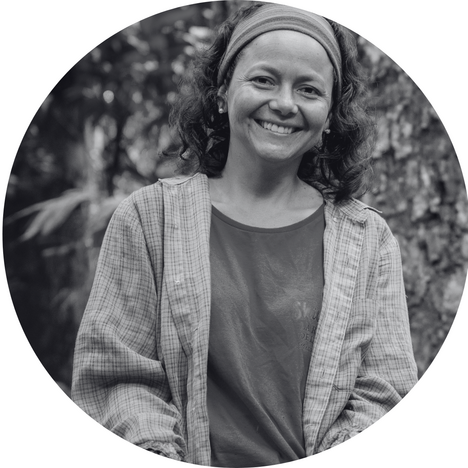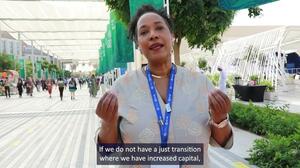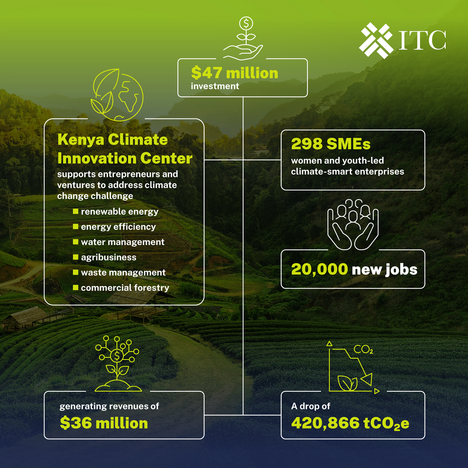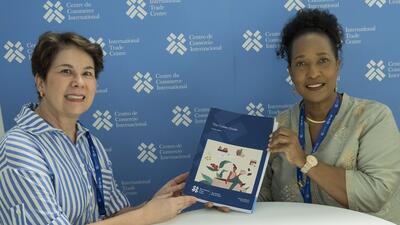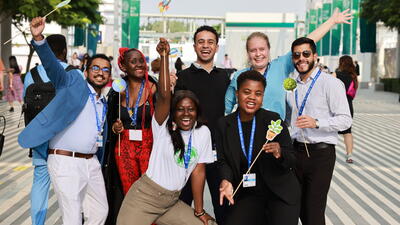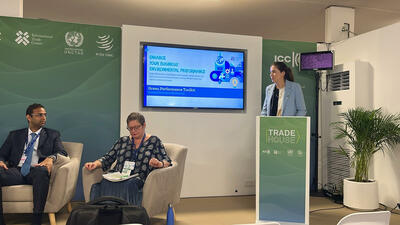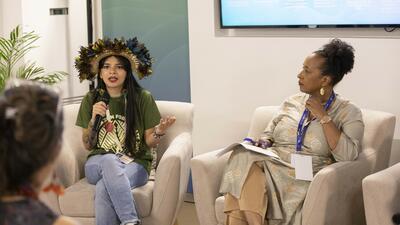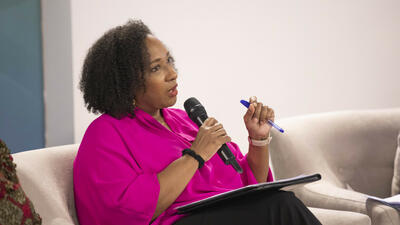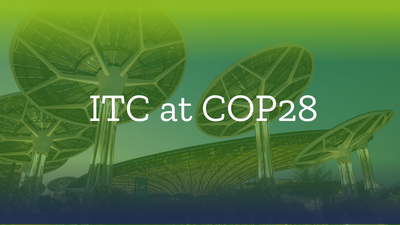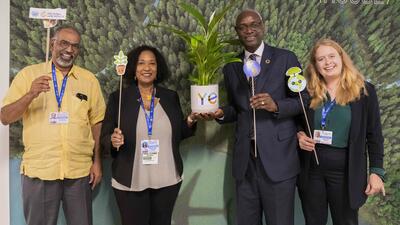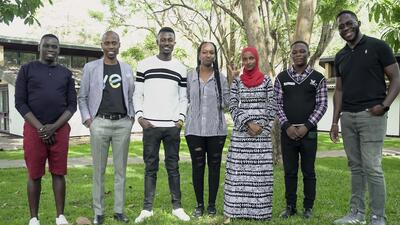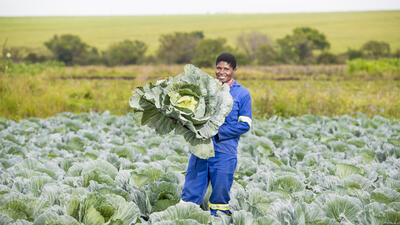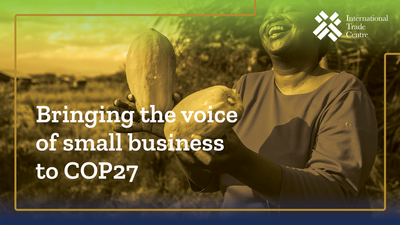ITC at COP28
Overview

COP28, the 28th United Nations Climate Change Conference, kicks off in Dubai on November 30, and for the first time the subject of Trade will feature prominently at the table of negotiations.
ITC will highlight the importance of small businesses around the world and why climate action needs to happen with a 'just transition', which is an inclusive transition, involving the participation of small businesses, and especially those led by youth, women, indigenous communities, and marginalized groups.
Programme
Sunday
3 December 2023
Building a Just Transition in the context of small business development needs to relate to the realities of local communities, migrants, children, persons with disabilities and people in vulnerable situations and the right to development, as well as gender equality, empowerment of women and intergenerational equity.
Ms. Pamela Coke-Hamilton

Celeste Drake

Rayana Edwards

Victor Menotti

Txai Suruí

Monday
4 December 2023
Iraq's Nationally Determined Contribution (NDC) targets a conditional 15% reduction in greenhouse gas (GHG) emissions by 2030, or 90 million metric tons of carbon dioxide (MMtCO2) per year. 13% of this commitment is conditional on USD 100 billion in financial and technical assistance. The country’s commitment remains modest, with significant development gaps in different sectors and a strong focus in the NDC on curbing emissions from key energy-consuming sectors (oil and gas, electricity and transport). In adaptation, strong investment in the agri-food sector is recognized as a critical element in diversifying the economy, promoting green growth, and building community resilience to the impacts of climate change.
Key thematic discussion will revolve around.
1- Institutional (public sector) readiness: Reflect on the Government of Iraq’s climate finance strategy to promote green growth, with a focus on bridging the funding gap and sustaining climate finance in Iraq.
2- Leveraging impact/social investments: Discuss the role of impact investors in promoting green growth in Iraq, including opportunities to direct resources to projects and initiatives that generate positive environmental and social impacts, while meeting national climate objectives and generating financial returns.
3- Leveraging public-private partnership (PPPs): Assess the role and potential of public-private cooperation for climate-positive investments, which is critical to identifying innovative solutions and mutually beneficial outcomes that promote sustainable economic developments and job creation.
Ms. Vanessa Erogbogbo (Moderator)

Mr. Vamsi Duraibabu
Dr. Maher Hammad Johan
Mr. Nikita Parfeniouk
Mr. Martin Frick

Dr. Yousif Yousif
This panel will explore the importance of enabling small businesses’ climate actions in SIDS, LLDCs and LDCs in the context of climate and financial justice. It will explore the need for access to climate finance for small business and marginalized communities, as well as sustainable and innovative business models. Partner: UN-OHRLLS
Ms. Pamela Coke-Hamilton

H.E. Rabab Fatima

Dr. Hyginus ‘Gene’ Leon

Dr. Carolyn Deere Birkbeck

Mr. Sivendra Michael

Tuesday
5 December 2023
This panel will facilitate a meaningful and solutions-oriented dialogue toward achieving deforestation-free global value chains. The conversation will highlight national and international efforts of forest protection, private sector initiatives, innovative sustainable business models, and key enabling policy solutions.
In recognizing that deforestation is just one factor that exacerbates climate change and nature loss challenges, the panellists will explore how businesses, including smallholders, local communities and indigenous peoples can prepare for changing frameworks on environmental sustainability, and how trade and related policies can support this transition.
Ms. Pamela Coke-Hamilton

Ms. Vanessa Erogbogbo (Moderator)

Mr. Raoni Guerra Lucas Rajão

Mr. Tran Ban Hung

Mr. Peter Justice Dery

Mr. Kemo Fatty

Wednesday
6 December 2023
This session aims to explore:
• How the design and implementation of the current mechanisms for financing climate change are taking gender perspectives into account.
• What are the key challenges for small businesses when it comes to climate finance.
• How sustainable trade can support mobilizing the climate finance advance on gender equality.
This session will showcase the small business perspective and examine the issues faced on the journey to sustainability, looking at the inclusive finance and trade solutions that can empower a small business to take climate action.
Partner: Caribbean Development Bank & Asian Development Bank
Ms. Ashaki Goodwin

Mr. Joseph Murabula

Ms. Vanessa Erogbogbo (Moderator)

Mr. Edgar Vasquez Vela

The session will bring together ecosystem enablers and youth entrepreneurs to discuss opportunities and priorities to promote small business climate action in developing countries, and share stories of small businesses climate action from around the world.
Fiona Shera

Hamza Cherif D’Ouezzan

Dr. Damie Sinanan

Ernest Chitechi

Ms. Dorothy McAuliffe

Friday
8 December 2023
It highlights the critical need to include often overlooked constituencies - youth, women, and indigenous communities - in our shared quest for a sustainable future. The discussion will delve into how embracing inclusivity is key to driving a green and just transformation.
Featuring a dynamic mix of young ecopreneurs, indigenous youth, and professionals committed to inclusive trade, the panel fosters a rich, collaborative conversation. They will dissect various approaches to bridge current divides and cultivate an ecosystem conducive to nurturing the upcoming wave of socio-eco-innovators. This conversation underscores the value of diverse viewpoints in driving enduring and sustainable change, particularly on how to foster climate action in mitigation, adaptation and resilience building. It aims to shed light on how a supportive and inclusive environment can empower these leaders to usher in a world that is not only greener but also more just and equitable.
Mr. Betrand Piccard

Ms. Josefa Tauli

Mr. Federico Perez

Ms. Mawuse Gyisun

Ms. Paula Padrino Vilela

Mr. Mashur Shurid

Ms. Milena Niehaus

Businesses can gather meaningful data that allows them to track their environmental performance through time, as well as indicate how far a company is from its target consumption levels.
The panel will launch the tool and showcase pathways to resource efficiency. The panel will share a wealth of experiences, including lessons learnt from small business and business support organizations.
Fiona Shera

Mr. Abdulrhman Zaki Elhalafawy

Ernest Chitechi

Mr. Vamsi Duraibabu

Ms. Ana Batalhone

Saturday
9 December 2023
Fostering sustainable business models of nature-based value chains is essential to delivering inclusive and sustainable socio-economic development, and to accelerating the green transition.
Particularly within developing economies and countries with significant biodiversity, the bioeconomy offers a path to better livelihoods, while preserving native flora and fauna.
The session will bring together parties, practitioners, international and regional agencies and SMEs to explore the role trade can play in fostering sustainable and inclusive bioeconomy value chains.
Fiona Shera

Ms. Chantal Line Carpentier

Ms. Ana Margarida Castro Euler

Mr. Mahmood Patel

Ms. Sofia Rubio

Sunday
10 December 2023
To secure the low carbon future, producers organisations, small holder farmers and communities cannot be left behind. These farmers are living through the changes in climate, are vulnerable from it, while at the same time are already providing sustainable and inclusive solutions for transforming food system.
This session will discuss the role that trade can and should play to promote social and economic development and help deliver a just agroecology transition.
Partners: Fairtrade International and UNEP
Mr. Dinesh Prasad Parajuli

Ms. Josephine Akia Luyimbazi

Mr. Innocent Owomuhangi

Mr. Butch Bacani

Ms. Sandra Uwera

Mr. Mario Cerrutti

Mr. Hernan Manson

Video
For the first time, Trade will feature as a specific theme at the COP28, and it will take place in Dubai from November 30. The conference will have a dedicated space in the Trade House pavilion, which aims to spark conversations and share solutions on how trade can help drive climate action, hosted by four international agencies: the International Chamber of Commerce (ICC), the International Trade Centre (ITC), the United Nations Conference on Trade and Development (UNCTAD) and the World Trade Organization (WTO). Visit the new Trade House website to stay up to date with all events and activities and ensure that you’re also part of the conversation.
Small businesses play a crucial role in international trade, and in fighting climate change. ITC is bringing these entrepreneurs from the around the world to give voice to their experiences.
Hamza Cherif D'Ouezzan is the driving force behind the Anou Cooperative, a movement dedicated to transforming the craft market and empowering rural artisans, promoting sustainability and community-led change. Hamza is a US State Department Middle East Partnership Initiative (MEPI) alumnus with a master's degree from IÉSEG School of Management.
Anou Cooperative includes 800 artisans and rural small businesses. With ITC support, they are pioneering artisan-owned and artisan-managed direct market access initiatives that include an online marketplace for products and custom orders, as well as physical retail hubs for workshops and residencies. They champion a sustainable supply chain, introducing Africa's first carbon-negative wool mill, paired with a solar farm.
Mahmood Patel, a proficient agriculturist, hotelier, and filmmaker, is the owner and operator of Coco Hill Forest. He describes it as an agrotourism project. Patel's expertise in regenerative agroforestry, with a focus on coconuts, cocoa, and ginger, extends to his role as a delegate representing Barbados at COP28. His dedication to sustainable agriculture and the exploration of by-products further underscores his multifaceted contributions to various fields.
Assisted by ITC expertise, Patel is attempting to create the linkage between tourism and agriculture to help address food security, resilience and reduce foreign currency leakage.
Abdulrhman Zaki Elhalafawy, a finalist of ITC Youth Ecopreneur Award, has over six years of experience in project management and business development and dedicates his expertise to pressing environmental issues.
As a co-founder of Cupmena, he spearheads a pioneering initiative in Egypt that efficiently repurposes spent coffee grounds for mushroom cultivation, reducing carbon emissions and addressing waste management.
Rayana Edwards, a leader in South Africa's sustainable apparel industry, directs the transformative mission of Sari For Change. There, she upcycles saris into new garments, reducing waste and empowering unskilled and unemployed women, in line with ITC’s objectives of reaching climate action with a just transition.
Her impact extends globally, with clients in the United States, Sweden, and Denmark. Recognized for her dedication to environmentally responsible practices, Rayana, a participant in the ITC SheTrades accelerator programme, has received the Women's Leadership Award from Goldman Sachs and Fortune Media, along with the prestigious SAB Foundation Social Innovation Award in 2022 in South Africa.
Sofía Rubio works in the heart of the Amazon rainforest. She is a versatile professional, combining her passion for gastronomy, biology, and entrepreneurship to champion the conservation of nature.
Sofía is the founder of Shiwi, a social enterprise and a participant in the ITC Green to Compete Hub, dedicated to creating innovative market models for trading goods sourced from conservation areas in Peru. Sofía's extensive experience spans the Pacific coast, the Andes, and the Amazon rainforest in Peru. Through these endeavors, Shiwi fosters environmental conservation, community well-being, and the responsible use of natural resources in Peru.
What is a BSO, and how does it influence climate action?
A Business Support Organization (BSO), as classified by ITC, is any organization or institution that provides support or capacity-building services to businesses and entrepreneurs.
They are key support organizations that help small businesses grow, sell more, improve inclusivity, be compliant, and address various other areas.
For COP28, which starts on November 30, ITC will take a group of five BSOs to participate in the world's largest climate change talks, aiming to enhance their voices in the decision-making processes related to climate action. These are the five ITC BSO delegates:
ADEX is the Asociacion de Exportadores or Exporters Association, in Peru, and part of the GreenToCompete Hubs network. In the agro export's realm, ADEX's influence has been profound, boasting over $149 million in natural product exports in 2020. The company stands as a beacon of success in tara, Amazon nut, and maca trade. The agricultural sector witnessed a collective surge, with fruits, vegetables, coffee, and cocoa contributing to an impressive $4 billion in exports during the same period.
ADEX actively supports green initiatives by incorporating sustainable practices and environmental considerations into its agro exports, thereby positively influencing climate action. Their manufacturing process is equally noteworthy, generating over 300 thousand jobs and driving substantial exports in confections, metal-mechanical, jewellery and goldsmith industries. In 2021 alone, confections surpassed $789 billion, featuring popular items like polos and shirts. Metal mechanical exports exceeded $397 billion, with highlights on drilling machines, while jewellery and goldsmith exports totalled over $85 billion.
The extractive industries sector, guided by ADEX, achieved remarkable heights. From fishing and aquaculture's over 3 billion in exports (2021) to mining and quarrying's 30 billion, spotlighting copper and gold, and timber and wood industries' over 122 million featuring closed and profiled woods.
The Federation of Nepalese Chambers of Commerce and Industry has 2,752 registered members, who are driving sustainable initiatives.
Kulayan Natural is one of the registered members of FNCCI, specializes in essential oils, herbs, and spices, practicing sustainable farming and partnering with local communities in a powerful Public-Private Partnership. With a processing capacity of 5.0 metric tonnes per day, it's meeting market demands in a sustainable manner.
Benefiting from the ITC GreenToCompete Hub through FNCCI, Kulayan Natural implemented short-term adaptation measures like cooling zones for workers and solar panels for water supply. The impact is evident - increased working capacity and higher MAPs production. Rainwater harvesting systems are in the pipeline.
The Kenya Climate Innovation Center is playing a significant role in climate action by supporting small businesses in renewable energy, energy efficiency, water management, waste management, and commercial forestry, contributing to the creation of over 39,500 jobs, particularly for women and youth-led enterprises in Africa.
Beyond the statistics, KCIC has attracted over $47 million in investments for more than 250 businesses, generating revenues of $36 million and reducing carbon emissions by 420,866 tons. KCIC also provides a supportive ecosystem—offering advice, creating conducive working spaces, and facilitating access to funds and crucial information.
As COP28 approaches, KCIC's participation not only showcases their commitment to climate action but also opens doors for broader networking and collaboration. This involvement is anticipated to contribute to the broader narrative of resilience and sustainability, fostering positive impacts as a solution to climate challenges.
Explore the Kenya Climate Innovation Centre, a Business Support Organisation (BSO) participating in COP28. Delve into the quantitative impact of their work, emphasizing the essential role BSOs play in Kenya's economic fabric. Shed light on the broader global implications, showcasing how BSOs contribute not only to national economies but also to the world economy and trade.
Participatory Ecological Land Use Management is a regional network spanning 12 countries in East, Central, and Southern Africa.
PELUM is dedicated to improving the livelihoods of small-scale farmers through ecological land use management, with a presence in Uganda, Kenya, Tanzania, Rwanda, Malawi, Zambia, Zimbabwe, Lesotho, Botswana, South Africa, Swaziland, and Ethiopia.
Their achievements include reaching 12,900 farmers, establishing 11 Agroecology Centers of Excellence, and influencing 12 policies, focusing on empowering women and youth.
PELUM's contribution to climate change mitigation in Uganda through eco-friendly agricultural practices, reducing greenhouse gas emissions, is commendable.
As PELUM gears up for COP28, they aim to share insights, strategies, and successes in the domain of participatory ecological land use management. Stay tuned for updates on their impactful journey at COP28.
Caribbean Export Development Agency in COP28 ITC, highlighting their commitment to sustainability and resilience. The Caribbean is home to more than 23 million people with a diverse cadre of businesses operating in a multitude of sectors. Caribbean Export is the regional trade and investment promotion agency focused on building a resilient Caribbean by providing cutting-edge and high-impact support to the private sector. Caribbean Export works closely with businesses to increase exports and attract investment. Milestones:
Partners: 5
Implementation rate: 85%
Current fund managed: $39 million (US)
Countries: 15
- Alliances for Action: Partnerships for Sustainable Food Systems
- Benchmarking assessment including BSO and SME assessment on sustainability
- Center for Circular Economy in Coffee
- Climate Competitiveness Assessment Tool: Providing a public good on physical, transitional risks, and market opportunities in the low-carbon economy
- Climate Smart Network: connecting climate smart businesses in developing countries with international buyers
- Ghana: Developing cocoa and associated crops through the Sankofa Project empowered by Alliances for Action
- Green Moonshot Brochure
- Green Performance Toolkit: Free online platform that helps businesses to assess and track their environmental performance across different criteria and identify improvement areas
- GreenToCompete Hubs: Hosted by business support organizations at the country level, the Hubs develop small businesses’ capacity to implement green business practices
- Greening your ICT operations training - SME Trade Academy
- GTEX/MENATEX: A sustainable approach: Boosting small businesses in textiles and clothing
- GTEX/MENATEX: Supporting textile and apparel manufacturers in going green
- ITC Roundtables on Deforestation free Global Value Chains
- ITC SME Trade Academy: Online courses on sustainability topics tailored to the needs of small business
- Video: Mark Massoud, inspiring sustainability: Youth Leading the Way
- Resource Efficient and Circular Production Processes: Coaching programme for small businesses’ to reduce, reuse and recycle natural resources in their production process
- SME Competitiveness Outlook 2021: Empowering the Green Recovery
- SME Competitiveness in Francophone Africa 2023: Building Resilience to Climate Change (also available in French)
- Trade in Critical Minerals – Monthly Briefs September 2023
- Video: NTF5 electronic waste management startup talks about their sustainable business in Senegal










